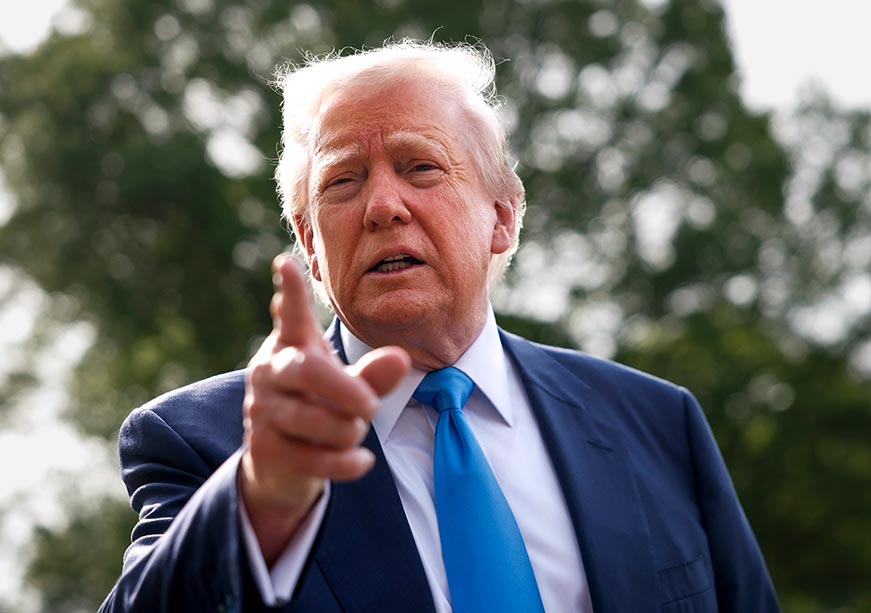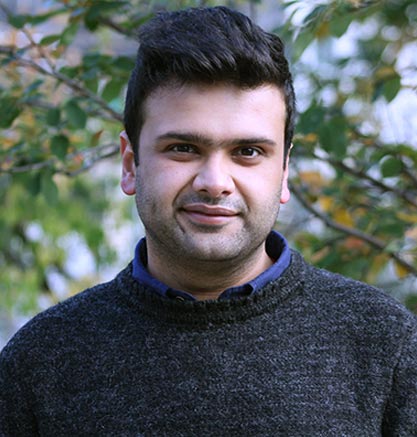-
CENTRES
Progammes & Centres
Location
Donald Trump’s idea of machine politics has not just conditioned his view of domestic politics, but also of international relations and US foreign policy

Image Source: Getty
As mutual tariffs between China and the US exceed 100 per cent, and all other major American trading partners experience a cycle of ad hoc tariff application and backtracking, it has left the global trading system in complete disarray. Order books have started to dry up, prospects of future investments look bleak, and a potential surge in American inflation seems likely.
Amidst this chaos, the first US-China trade war during President Donald Trump’s first tenure seems like a breeze and wasn’t quite as existential as the current one. The difference in scale and intensity of the two trade wars raises a key question: Why was Trump’s trade policy relatively restrained during his first term? After all, it ended with the successful renegotiation of NAFTA and a capping of the US-China trade war within a certain threshold via diplomatic engagements.
The most obvious explanations for the lack of Trump’s restraint is his complete takeover of the Republican Party, the Republicans controlling the executive and the legislature, and a favorable judiciary. Couple this with the fact that Trump’s views on US trade policy and how the rest of the world has short-changed America have stayed relatively stable since the 1980s. He came of age at a time when Japanese exports to the US were surging, and a range of industries — automobiles to consumer electronics — were dominated by companies from Japan.
Couple this with the fact that Trump’s views on US trade policy and how the rest of the world has short-changed America have stayed relatively stable since the 1980s.
In 1987, he published a full-page open letter in The New York Times, The Washington Post, and The Boston Globe, complaining about exactly this. The ad said, “They have brilliantly managed to maintain a weak yen against a strong dollar. This, coupled with our monumental spending for their, and others’ defence, has moved Japan to the forefront of world economies. It’s time for us to end our vast deficits by making Japan pay.” A few months later, he remarked on The Oprah Winfrey Show, “We let Japan come in and dump everything right into our markets and everything — it’s not free trade.”
Sounds eerily similar to most of Trump’s speeches over the past decade? Replace Japan with China, and this could still be something Trump might have said just two days ago. However, there was a crucial difference between Japan and China and, importantly, also between the US of the 1980s and the present.
Back in the late ’70s and early ’80s, the US had quite an overvalued currency and was running large deficits with countries like Japan, West Germany, and Saudi Arabia. This would eventually result in the Plaza Accord in 1985 — which facilitated a massive devaluation of the US dollar relative to the yen, franc, sterling, and deutsche mark. Ideally, the US would have liked to force China to undertake a similar appreciation of the renminbi and reduce the scale of its subsidy-reliant industrial policy. However, by the time of the global financial crisis, the US had lost the power to enforce Plaza Accord 2.0 (with China). Trump’s trade policy ideas over the past decade can largely be seen in this context. However, beyond Trump’s underlying trade policy ideas and his domination over US federal politics, there is a deeper and more formative view of politics that has driven his trade wars over the past couple of months. After all, it was not the Japan shock of the 1980s, but the lingering machine politics of New York City through the 1960s and ’70s that formed Trump’s underlying template of politics.
Beyond Trump’s underlying trade policy ideas and his domination over US federal politics, there is a deeper and more formative view of politics that has driven his trade wars over the past couple of months.
In a nutshell, New York’s politics from the early 1800s to about the 1960s (with some exceptions) can broadly be categorised as machine politics. Centered around the Tammany Hall society, New York’s machine politics worked by dominating all municipal-level political and administrative positions and institutions, which would then be operationalised to provide patronage through jobs, contracts, houses, and mortgages to different social groups in return for their loyalty. While US President Franklin D Roosevelt and his Democratic Party’s New York Mayor Fiorello La Guardia crushed machine politics, its influence on the city’s politics continued till the 1970s.
It is precisely in this era of lingering machine politics that Trump’s father, Fred Trump, learned how to do business and expanded his real estate business throughout Queens and Brooklyn. He did so by attaching himself to the Kings County Democratic County Committee (which would later become the Brooklyn Democratic Party) — the strongest political machine of the time. As highlighted in Maggie Haberman’s book, Confidence Man: The Making of Donald Trump and the Breaking of America, Trump owes his political worldview to his dad. Trump grew up witnessing his father’s several run-ins with local and federal agencies and developed a certain level of immunity towards them. In turn, his business career would involve an even greater number of legal and financial proceedings.
Over time, as Trump joined his father’s business, his political ideas and modus operandi were further developed under some of the last remaining veterans of New York’s machine politics era, especially his lawyer Roy Cohn and NYC’s Mayor Abe Beame. “A central lesson Trump would take from his mentor (Roy Cohn) was that literally everything could be treated as a transaction. A person’s worth would be determined by whether they were liked or what they owed you,” writes Haberman in her book.
Another formative aspect of the Trumpian worldview, which he owes to his grounding in machine politics, was the role of respect, as pointed out by Charlie Laderman and Brendan Simms in their book, Donald Trump: The Making of a World View. He saw life as endless “combat,” where a lack of victory was intolerable, according to the authors. “When you get the respect of the other countries, then the other countries tend to do a little bit as you do, and you can create the right attitudes,” Trump told Rona Barrett of NBC in 1988.
Trump’s idea of machine politics has not just conditioned his view of domestic politics, but also of international relations and US foreign policy.
Apply some of these core ideas of machine politics to Trump’s 2024 presidential victory, and it all starts to add up. According to his understanding, Trump might have won the 2016 election, but it was only in 2024 that his MAGA machine effectively took over the US. Significantly, Trump’s idea of machine politics has not just conditioned his view of domestic politics, but also of international relations and US foreign policy. And he thinks that the US is the primary political machine in the international system, and it ought to get what it wants.
According to Robert Putnam, most international negotiations can be seen as a two-level game, whereby a leader’s job is to negotiate an international agreement that satisfies his domestic constituents and pressure groups, as well as minimise the damage from foreign developments. Trump views the ongoing trade wars between the US and its adversaries as similar two-level games.
Except, there is a catch. Most of the current US-related trade wars are at least three-level games, involving the US political economy, the adversary’s political economy, and the markets. Contrary to Trump’s crude political understanding, his political machine dominates just one of those levels, the US political economy, at least until potential inflation starts hurting his popularity. If such risky iterated games continue, they can wreck not just the trading system but also raise existential questions about the role of the US dollar in the global financial system.
This commentary originally appeared in The Indian Express.
The views expressed above belong to the author(s). ORF research and analyses now available on Telegram! Click here to access our curated content — blogs, longforms and interviews.

Srijan Shukla is an Associate Fellow working with the geoeconomics and the forums team. His research focuses on domestic and international political economy. In the ...
Read More +